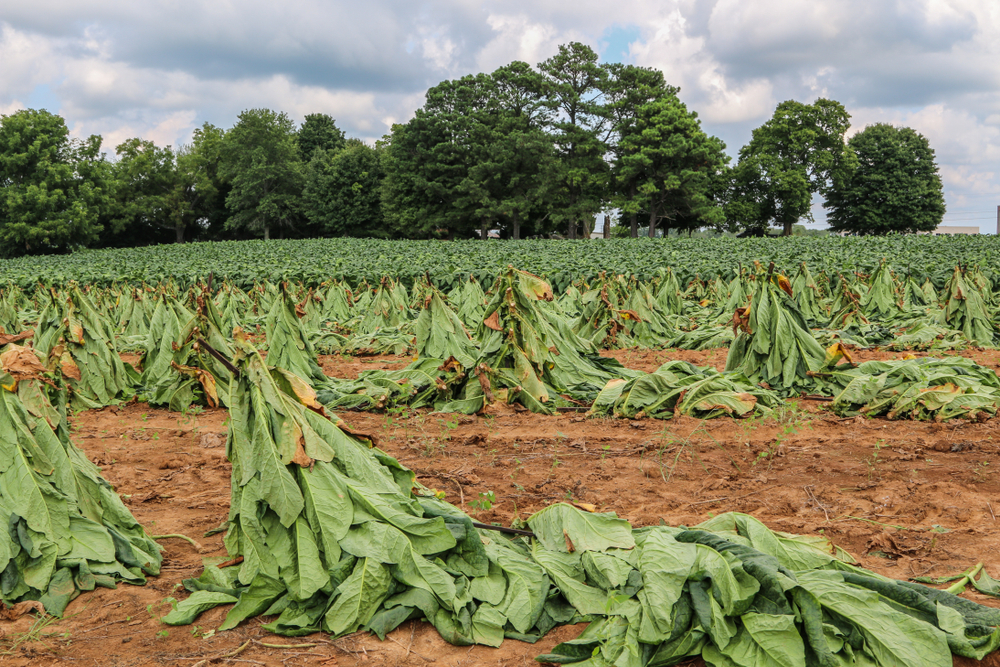Agriculture is an important part of the Tennessee economy. It contributes billions of dollars directly and indirectly, and the state is in the top half of the nation in the production of most crops, including soybeans, corn, and tobacco. Unfortunately, many of those crops are closely associated with the controversial herbicide glyphosate, better known by the brand name “Roundup.”
Farming and forestry contribute about $80 billion per year to the Tennessee economy, which accounts for about 8% of the state’s entire economic output. Farming’s legacy in Tennessee is one reason why many people across the state are concerned about their potential exposure to an herbicide that’s been linked with cancer.
Roundup is the subject of thousands of class-action lawsuits alleging that the weedkiller causes or contributes to cancer. Bayer, the company that owns the brand, has proposed about $12 billion in settlement money to end current and future cases.
What should Tennessee residents who have used glyphosate know about this herbicide, the lawsuits surrounding the product, and what negative health implications they may be facing?
What Does Roundup Do?
While Roundup is famous today because it has become a ubiquitous weedkiller and because it is at the center of thousands of lawsuits, the active ingredient has a different history altogether.
History of Roundup
For most of its history, glyphosate was used mostly in the commercial heating and plumbing industry to remove scale from boilers, pipes, and other equipment.
But a Monsanto researcher in the early 1970s discovered that glyphosate was lethal to plants, and so in 1974, Monsanto patented the chemical as an herbicide and began selling it under the brand name Roundup.
Roundup is a non-selective herbicide, which means it will kill just about any plant it comes into contact with. Research has indicated that it does this by preventing plants from producing an enzyme they need to grow and thrive. This enzyme has also served as one of the biggest reasons for Monsanto and its parent company, Bayer, to claim that Roundup can’t hurt people, because this enzyme does not occur in humans.
Roundup & Tennessee Agriculture
Since being introduced to the world in the early 1970s, Roundup has become the best-selling herbicide in history, and it has been applied to farm fields, school grounds, residential lawns, parks, and dozens of other types of spaces. In fact, you may have a bottle or two in your shed right now.
While it is in wide use across many areas, its biggest use is in the agricultural industry. Millions of pounds of glyphosate are used in American farming every year, and according to U.S. Geological Survey data, about 72 million pounds of it have been used on Tennessee farms since 1992.
Let’s take a closer look at farming and glyphosate in Tennessee:
- Since 1992, about 71.5 million pounds of glyphosate have been applied to Tennessee farm fields, ranking the state 21st nationwide in terms of the amount used, just ahead of Louisiana.
- In 2017, the most recent year for available data, about 4.2 million pounds of glyphosate were used in Tennessee agriculture, which represents an 81% increase since 2000.
- Glyphosate is the most used herbicide or pesticide in Tennessee agriculture by a factor of more than three.
- Soybeans (52%) and corn (31%) account for the vast majority of glyphosate used in Tennessee farming, but about 11% is used to produce cotton.
- Tennessee ranked eighth for cotton production in 2020, with the state’s farming community generating about 640,000 bales. More than 135 million bushels of corn were produced (17th), and the state produced about 79 million bushels of soybeans (16th).
Is Roundup Dangerous?
Unfortunately, the answer to this question depends on whom you ask. The tens of thousands of people who have filed lawsuits over the herbicide would certainly say yes, but Monsanto and its parent company, Bayer, would disagree.
So, let’s look at the cancer connected to Roundup by lawsuits and medical studies and explore Roundup’s legal and regulatory status.
What Is Non-Hodgkin Lymphoma?
Most cases over Roundup center on plaintiffs who were diagnosed with non-Hodgkin lymphoma, or “NHL,” and all three trials that have resulted in jury verdicts involved plaintiffs with that type of cancer.
Like all types of lymphoma, NHL is a cancer that develops in the body’s white cells. Multiple types of lymphoma are classified under the NHL umbrella, though it excludes another well-known form of cancer, Hodgkin lymphoma.
The American Cancer Society projects that about 82,000 Americans will be newly diagnosed with NHL this year, and the cancer accounts for an estimated 4% of all U.S. cancer cases. An estimated 21,000 people are expected to die from NHL this year.
Tennessee residents who have been exposed to Roundup or glyphosate should pay close attention to a few symptoms that could signal NHL, though signs vary by person and the extent of their cancer:
- Chest pain
- Cough
- Chills
- Easy bruising
- Fatigue
- Fever
- Frequent, severe infections
- Night sweats
- Shortness of breath
- Swollen abdomen
- Swollen lymph nodes
- Weight loss
Whether or not you’ve used Roundup, if you are experiencing multiple symptoms on this list, you should consult with your doctor. And if you are a Roundup user who has had any of these symptoms, you should seek an exam from your doctor.
When it is detected early, NHL has a relatively high survival rate, and more than 70% of people who are diagnosed in the earliest stage will live at least five years after their diagnosis.
Aside from the lawsuits that have connected Roundup to non-Hodgkin lymphoma, recent academic research has further established this connection. In fact, a study published by the University of Washington determined that being exposed to glyphosate increases the risk of NHL by 40%.
Roundup’s Regulatory Status
If lawsuits and academic studies have linked Roundup to cancer, why does it remain on store shelves? The U.S. Environmental Protection Agency (EPA), which is responsible for determining whether herbicides or pesticides are safe for use, lists it as non-carcinogenic —which means it does not cause cancer.
However, the International Agency for Cancer Research, the states of California and New York, Mexico, Thailand, and many communities across the country have all determined that glyphosate’s potential for causing cancer is too great for the chemical to be used.
The EPA has reviewed and approved glyphosate’s use in the U.S. as recently as 2020.
What’s the Current Status of Roundup Litigation?
More than 120,000 class-action lawsuits and a multijurisdictional litigation have been filed so far alleging that Roundup causes cancer, and three cases have completed the trial phase. In each of those cases, plaintiffs were awarded multimillion-dollar judgments by jury members, though all were reduced on appeal.
Still, with losses mounting, Bayer AG, the German pharmaceutical company that bought Monsanto a few years ago, has offered multiple settlements to end current and future cases.
In the summer of 2020, Bayer said it would set aside $10 billion to end the majority of existing cases, and while some plaintiffs are said to have accepted those offers, settlements have not yet been approved.
Additionally, in 2021, Bayer suggested setting aside $2 billion to fund payments in future lawsuits that have yet to be filed.
Negotiations are ongoing on both settlement fronts, and at least one hearing is planned for summer 2021.
Labeling Class-Action Settlement
Separately, most states have approved a $40 million class-action settlement over Roundup’s labeling. This relates to a class-action lawsuit that alleged that the product’s label was misleading, as it claimed Roundup was safe for humans and pets, because it targets a plant enzyme that’s not in mammals.
Tennessee residents who purchased Roundup after Feb. 13, 2015 because of the mention of the plant enzyme could be eligible for up to $90 in compensation.
How Much Can I Get From a Roundup Lawsuit in Tennessee?
All three jury verdicts against Roundup so far have been in the millions, and all together, the figures reach into the billions. However, none of the plaintiffs in those cases have gotten paid yet, and all the awards have been reduced on appeal.
However, there’s reason to believe a figure in the ballpark of $165,000 may become standard. That is what was estimated to be the average payout if the $10 billion settlement were approved, and the company has proposed adding accelerating or mitigating factors that would increase or decrease an award.
For example, survivors of Roundup users who died from NHL would be expected to receive the highest sums, while victims who were diagnosed at an old age would be expected to receive the least. Also, it’s expected that the settlements will apply only to U.S. citizens, so migrant workers who used Roundup and became sick may not be eligible.
Again, though, with negotiations ongoing, these figures are subject to change.
What Should I Do if I Have Been Affected by Roundup?
If you’re a Tennessee resident who used Roundup or were exposed to it, it is recommended that you stop using the product if possible. If your use of Roundup is through your job, speak with your employer to see if they can provide a safe alternative product for you to use. Seek a consultation with your physician if you’re experiencing any of the symptoms we mentioned earlier, especially if you’re experiencing multiple signs of non-Hodgkin lymphoma.
For those who have already been diagnosed with NHL after using Roundup, there still is time to file a lawsuit to seek compensation for your injury. No settlements have gotten final approval, so the best way to be sure you can seek justice is to consult with an expert Roundup class-action attorney in Tennessee.
We can help connect you with a firm in your area, and unless you win your case, you probably won’t have to pay any legal fees. Most initial consultations are free.





